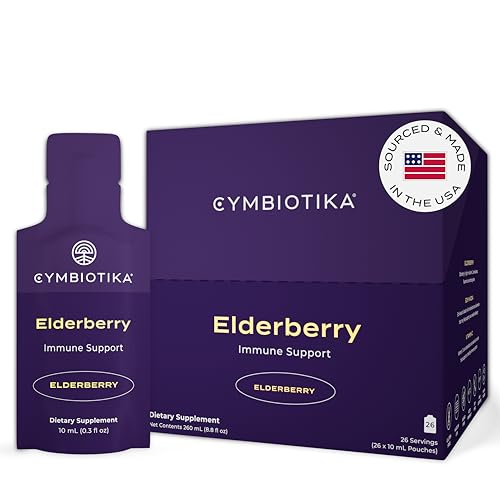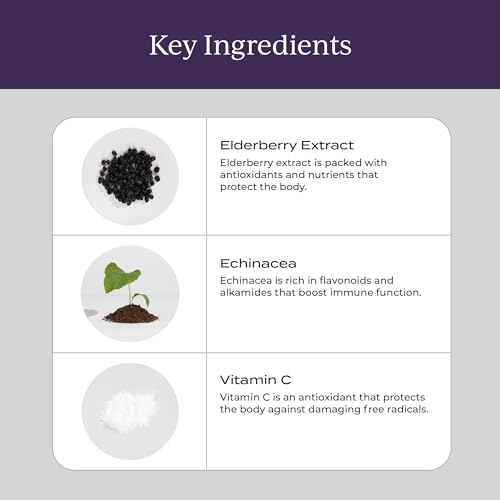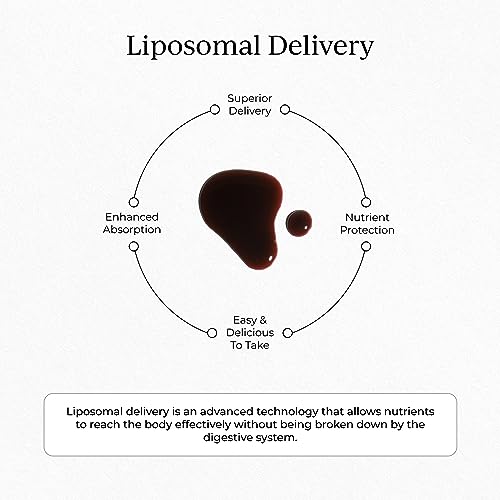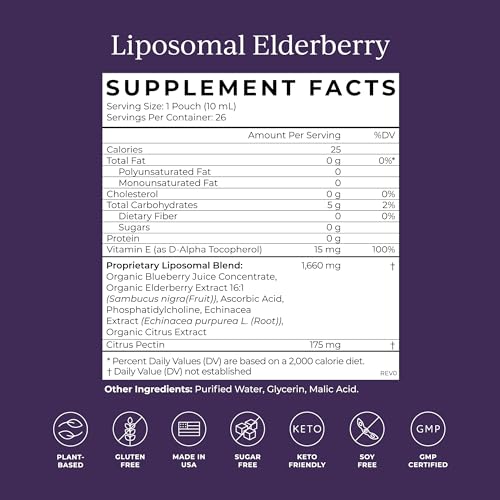








CYMBIOTIKA Elderberry Herbal Supplement - Immune Support with Antioxidants, Vegan, 26 Pouches


Malic Acid
High RiskMalic acid is a naturally occurring organic acid found in various fruits, particularly apples. It plays a role in the metabolic processes of living organisms and is commonly used as a flavoring agent, pH regulator, and preservative in food and cosmetic products.
Sustai Insights
Malic acid serves as an effective pH adjuster and flavor enhancer, contributing to the sensory profile of products. However, it may cause skin and eye irritation and has high use restrictions, limiting its application. Regulatory bodies have noted these concerns, leading to restrictions on its use in certain products. Overall, the ingredient is considered high risk due to these factors, necessitating careful usage and consideration of safer alternatives.
Lecithin
Medium RiskLecithin is a naturally occurring lipid found in various plant and animal tissues, primarily composed of phospholipids. It serves as an emulsifier, stabilizing mixtures of oil and water, and is commonly used in food, cosmetics, and pharmaceuticals to improve texture and extend shelf life.
Sustai Insights
Lecithin provides functional benefits as an effective emulsifier and stabilizer, enhancing product texture while being sustainably sourced from natural origins. Health risks are generally low, with moderate concerns regarding allergies and immunotoxicity but minimal cancer or reproductive toxicity risks. Environmental hazards are limited, and it is not classified as a pollutant. Regulatory bodies impose few restrictions. Overall, lecithin presents a medium risk, suggesting caution in usage, especially for sensitive individuals. Alternatives include sunflower lecithin or other plant-based emulsifiers that may offer similar benefits with reduced allergenic potential.
Apple Pectin
Low RiskApple pectin is a natural polysaccharide found in the cell walls of apples. It is commonly used as a gelling agent, thickener, and stabilizer in food products, as well as in cosmetics and pharmaceuticals. Its gelling properties are utilized to improve texture and consistency.
Sustai Insights
Apple pectin serves as an effective thickener and stabilizer, contributing to the texture of various products. It is biodegradable and derived from renewable sources, enhancing its sustainability profile. Health risks are minimal, with low concerns for carcinogenicity, allergies, or reproductive toxicity. Environmental impact is also low, with no known pollutants or bioaccumulation issues. Regulatory status is clear, with no current restrictions. Overall, the risk level associated with apple pectin is low, making it a safe ingredient for use in formulations.
Vegetarian Glycerin
Low RiskVegetarian glycerin, also known as glycerol, is a colorless, odorless, and viscous liquid derived from plant sources. It is primarily used as a humectant, solvent, and emollient in various personal care products, helping to retain moisture and improve texture.
Sustai Insights
Vegetarian glycerin offers functional benefits as an effective humectant, promoting hydration and skin smoothness. It is biodegradable and typically sustainably sourced. Health risks associated with glycerin are low, with no significant concerns for carcinogenicity, allergens, or reproductive toxicity. Environmental risks are minimal, and it is not subject to major regulatory warnings. Overall, the risk level for this ingredient is low, making it a safe choice in formulations. Safe usage practices include ensuring proper concentrations in products, and alternatives such as propylene glycol exist but may have differing properties.
Ascorbic Acid (Vitamin C)
Low RiskAscorbic acid (Vitamin C) is a naturally occurring antioxidant essential for various biological functions, including collagen synthesis and immune response. It is commonly used in cosmetic and food products for its preservative properties and ability to enhance skin brightness.
Sustai Insights
Ascorbic acid provides functional benefits as an effective antioxidant and preservative, contributing to skin health and product stability. It is generally recognized as safe with low health risks, including minimal concerns for carcinogenicity and allergies. Environmentally, it poses low risks, as it is biodegradable and does not bioaccumulate. Regulatory bodies like the FDA have not imposed significant restrictions on its use. Overall, the ingredient presents a low risk, with safe usage practices ensuring consumer safety, and alternatives such as natural extracts exist for those seeking different formulations.
Tocopherol, D Alpha
Low RiskTocopherol, specifically d-alpha tocopherol, is a naturally occurring form of Vitamin E. It is commonly used in cosmetic and personal care products primarily for its antioxidant properties, helping to protect formulations from oxidation and extend shelf life.
Sustai Insights
D-alpha tocopherol provides effective antioxidant benefits, contributing to product stability. It is sustainably sourced and generally regarded as safe, with low concerns regarding carcinogenicity, allergies, and reproductive toxicity. However, there are minor concerns about endocrine disruption. Regulatory bodies have not imposed significant restrictions, indicating low overall risk. Recommended usage practices include adhering to established safe concentration thresholds. Alternatives, such as other forms of Vitamin E or plant-based antioxidants, may also be considered.
Lecithin
Medium RiskLecithin is a naturally occurring lipid found in various plant and animal tissues, primarily composed of phospholipids. It serves as an emulsifier, stabilizing mixtures of oil and water, and is commonly used in food, cosmetics, and pharmaceuticals to improve texture and extend shelf life.
Sustai Insights
Lecithin provides functional benefits as an effective emulsifier and stabilizer, enhancing product texture while being sustainably sourced from natural origins. Health risks are generally low, with moderate concerns regarding allergies and immunotoxicity but minimal cancer or reproductive toxicity risks. Environmental hazards are limited, and it is not classified as a pollutant. Regulatory bodies impose few restrictions. Overall, lecithin presents a medium risk, suggesting caution in usage, especially for sensitive individuals. Alternatives include sunflower lecithin or other plant-based emulsifiers that may offer similar benefits with reduced allergenic potential.
Apple Pectin
Low RiskApple pectin is a natural polysaccharide found in the cell walls of apples. It is commonly used as a gelling agent, thickener, and stabilizer in food products, as well as in cosmetics and pharmaceuticals. Its gelling properties are utilized to improve texture and consistency.
Sustai Insights
Apple pectin serves as an effective thickener and stabilizer, contributing to the texture of various products. It is biodegradable and derived from renewable sources, enhancing its sustainability profile. Health risks are minimal, with low concerns for carcinogenicity, allergies, or reproductive toxicity. Environmental impact is also low, with no known pollutants or bioaccumulation issues. Regulatory status is clear, with no current restrictions. Overall, the risk level associated with apple pectin is low, making it a safe ingredient for use in formulations.
Vegetarian Glycerin
Low RiskVegetarian glycerin, also known as glycerol, is a colorless, odorless, and viscous liquid derived from plant sources. It is primarily used as a humectant, solvent, and emollient in various personal care products, helping to retain moisture and improve texture.
Sustai Insights
Vegetarian glycerin offers functional benefits as an effective humectant, promoting hydration and skin smoothness. It is biodegradable and typically sustainably sourced. Health risks associated with glycerin are low, with no significant concerns for carcinogenicity, allergens, or reproductive toxicity. Environmental risks are minimal, and it is not subject to major regulatory warnings. Overall, the risk level for this ingredient is low, making it a safe choice in formulations. Safe usage practices include ensuring proper concentrations in products, and alternatives such as propylene glycol exist but may have differing properties.
Ascorbic Acid (Vitamin C)
Low RiskAscorbic acid (Vitamin C) is a naturally occurring antioxidant essential for various biological functions, including collagen synthesis and immune response. It is commonly used in cosmetic and food products for its preservative properties and ability to enhance skin brightness.
Sustai Insights
Ascorbic acid provides functional benefits as an effective antioxidant and preservative, contributing to skin health and product stability. It is generally recognized as safe with low health risks, including minimal concerns for carcinogenicity and allergies. Environmentally, it poses low risks, as it is biodegradable and does not bioaccumulate. Regulatory bodies like the FDA have not imposed significant restrictions on its use. Overall, the ingredient presents a low risk, with safe usage practices ensuring consumer safety, and alternatives such as natural extracts exist for those seeking different formulations.
Tocopherol, D Alpha
Low RiskTocopherol, specifically d-alpha tocopherol, is a naturally occurring form of Vitamin E. It is commonly used in cosmetic and personal care products primarily for its antioxidant properties, helping to protect formulations from oxidation and extend shelf life.
Sustai Insights
D-alpha tocopherol provides effective antioxidant benefits, contributing to product stability. It is sustainably sourced and generally regarded as safe, with low concerns regarding carcinogenicity, allergies, and reproductive toxicity. However, there are minor concerns about endocrine disruption. Regulatory bodies have not imposed significant restrictions, indicating low overall risk. Recommended usage practices include adhering to established safe concentration thresholds. Alternatives, such as other forms of Vitamin E or plant-based antioxidants, may also be considered.
Malic Acid
High RiskMalic acid is a naturally occurring organic acid found in various fruits, particularly apples. It plays a role in the metabolic processes of living organisms and is commonly used as a flavoring agent, pH regulator, and preservative in food and cosmetic products.
Sustai Insights
Malic acid serves as an effective pH adjuster and flavor enhancer, contributing to the sensory profile of products. However, it may cause skin and eye irritation and has high use restrictions, limiting its application. Regulatory bodies have noted these concerns, leading to restrictions on its use in certain products. Overall, the ingredient is considered high risk due to these factors, necessitating careful usage and consideration of safer alternatives.
Discover the CYMBIOTIKA Elderberry Boost Supplement, a powerful ally for your immune system. This liposomal elderberry extract combines essential vitamins and plant-based nutrients to support your health naturally, making it a perfect choice for health-conscious consumers.
- Immune Support & Antioxidants: Packed with organic elderberry extract and echinacea, this supplement helps protect against illness while enhancing overall wellness.
- Rich in Vitamin C: Featuring ascorbic acid, this formula acts as a potent antioxidant to defend your body from harmful substances.
- Convenient Daily Use: Simply squeeze the elderberry syrup from the pouch or mix it into your favorite drink—ideal for on-the-go lifestyles.
- Vegan & Gluten-Free: Crafted with zero animal products and harmful additives, this supplement is suitable for various dietary preferences.
- Scientifically Backed: Merging traditional Eastern medicine with modern absorption technology, Cymbiotika ensures high-quality ingredients you can trust.
Elevate your health journey with CYMBIOTIKA Elderberry Boost, designed for those who prioritize both wellness and sustainability.
Subscribe & Save with Sustai
- Best Price Guarantee: Always enjoy the lowest prices on sustainable home essentials.
- No Surprises: We’ll notify you before shipping. No hidden fees, ever.
- You’re in Charge: Change, pause, or cancel your subscription anytime with ease.
- Eco-Friendly Deliveries: Our grouped shipments mean less packaging and lower emissions.
Join us on a sustainable journey. Special offers for a limited time! Prices and promotions may change.
Recommended Products
Discover the CYMBIOTIKA Elderberry Boost Supplement, a powerful ally for your immune system. This liposomal elderberry extract combines essential vitamins and plant-based nutrients to support your health naturally, making it a perfect choice for health-conscious consumers.
- Immune Support & Antioxidants: Packed with organic elderberry extract and echinacea, this supplement helps protect against illness while enhancing overall wellness.
- Rich in Vitamin C: Featuring ascorbic acid, this formula acts as a potent antioxidant to defend your body from harmful substances.
- Convenient Daily Use: Simply squeeze the elderberry syrup from the pouch or mix it into your favorite drink—ideal for on-the-go lifestyles.
- Vegan & Gluten-Free: Crafted with zero animal products and harmful additives, this supplement is suitable for various dietary preferences.
- Scientifically Backed: Merging traditional Eastern medicine with modern absorption technology, Cymbiotika ensures high-quality ingredients you can trust.
Elevate your health journey with CYMBIOTIKA Elderberry Boost, designed for those who prioritize both wellness and sustainability.

You can have at most 2 Sustainable Steals products in your cart
Customer Reviews
Customers’ View
Customers appreciate the taste, effectiveness, and quality of Cymbiotika's Elderberry Supplement. Many users highlight its pleasant flavor, noting that it is both delicious and slightly tart, making it enjoyable to consume daily. Feedback emphasizes the supplement's effectiveness in supporting immune health, with several customers expressing confidence that it helps keep them well during cold and flu season. The product’s high quality is frequently mentioned, with customers referring to it as a 'top quality' brand. Additionally, the natural and plant-based ingredients resonate well with health-conscious consumers, as the supplement is free from harmful additives such as gluten and GMOs. Overall, customers find this elderberry supplement to be a reliable addition to their wellness routine, aligning with their eco-friendly and health-focused values.
AI-generated from the text of customer reviewsThis product has no reviews yet.




